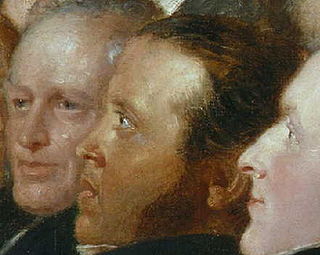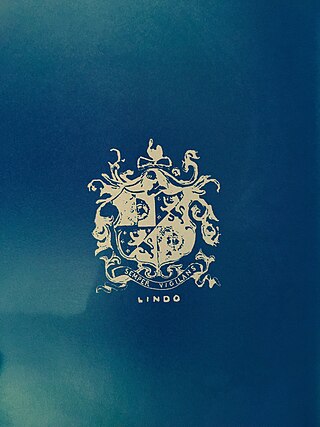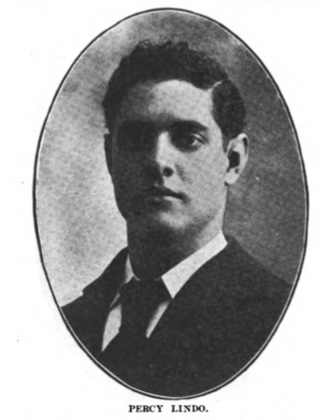
Bob Marley and the Wailers were a Jamaican ska, rocksteady and reggae band. The founding members, in 1963, were Bob Marley, Peter Tosh, and Bunny Wailer.

The Order of Distinction (OD) is a national order in the Jamaican honours system. It is the sixth in order of precedence of the Orders of Societies of Honour, which were instituted by an Act of Parliament in 1968. The motto of the Order is "Distinction Through Service".
Earl Wilberforce "Wire" Lindo, sometimes referred to as Wya, was a Jamaican reggae musician. He was a member of Bob Marley and the Wailers and collaborated with numerous reggae artists including Burning Spear.

William Knibb, OM was an English Baptist minister and missionary to Jamaica. He is chiefly known today for his work to free enslaved Africans.
Thomas MacDermot was a Jamaican poet, novelist, and editor, editing the Jamaica Times for more than 20 years. He was "probably the first Jamaican writer to assert the claim of the West Indies to a distinctive place within English-speaking culture". He also published under the pseudonym Tom Redcam. He was Jamaica's first Poet Laureate.
The history of the Jews in Jamaica predominantly dates back to migrants from Spain and Portugal. Starting in 1509, many Jews began fleeing from Spain because of the persecution of the Holy Inquisition. When the English captured Jamaica from Spain in 1655, the Jews who were living as conversos began to practice Judaism openly. By 1611, the Island of Jamaica had reached an estimated population of 1,500 people. An estimated 75 of those people were described as "foreigners," which may have included some Portuguese Jews. Many Jamaican Jews were involved in the Atlantic slave trade, both owning and trading in enslaved Black people.
Albert Huie was a Jamaican painter.
The Jamaica Baptist Union is an association of Baptist Christian churches, affiliated with the Baptist World Alliance, founded in 1849 in Jamaica. The headquarters is in Kingston, Jamaica. The president of the union is Rev. Dr. Glenroy Lalor.
James Stewart was a Jamaican-born politician and military officer. He was elected to the House of Assembly of Jamaica in 1820 for the parish of Saint Andrew.
Cinnamon Hill is a great house and sugar plantation associated with the Cornwall plantation located in St James Parish, Jamaica. It is close to Rose Hall and overlooks the sea. The House was started by Samuel Barrett junior, who had bought the Cornwall Estate. However he died and the work was continued by his son Edward Barrett (1734–1798). Edward also completed the Cinnamon Hill sugar works in 1784.

The 1944 Jamaica hurricane was a deadly major hurricane that swept across the Caribbean Sea and Gulf of Mexico in August 1944. Conservative estimates placed the storm's death toll at 116. The storm was already well-developed when it was first noted passing westward over the Windward Islands into the Caribbean Sea on August 16. A ship near Grenada with 74 occupants was lost, constituting a majority of the deaths associated with the storm. The following day, the storm intensified into a hurricane, reaching its peak strength on August 20 with maximum sustained winds of 120 mph (195 km/h). At this intensity, the major hurricane made landfall on Jamaica later that day, traversing the length of the island. The damage wrought was extensive, with the strong winds destroying 90 percent of banana trees and 41 percent of coconut trees in Jamaica; the overall damage toll was estimated at "several millions of dollars". The northern coast of Jamaica saw the most severe damage, with widespread structural damage and numerous homes destroyed across several parishes. In Port Maria, the storm was considered the worst since 1903.
Nerine Barrett is a Jamaican classical pianist, one of the few black women who have achieved international recognition as a pianist. She was selected in 1966 by the Young Concert Artists to appear at Carnegie Hall and the following year won the Mozart Memorial Prize of the Haydn-Mozart Society of London. In the 1980s, she began teaching music as a professor at the Hochschule für Musik Saar and later at the Hochschule für Musik Detmold. She continued to perform both as a solo artist and as part of the Trio Paideia.
Green Park Estate was one of several sugar plantations owned by William Atherton and his heirs. It was located in Trelawny Parish, south of Falmouth, Jamaica. By the early nineteenth century, at least 533 people were enslaved there producing mainly sugar and rum.
Stewart Town is a historic town that was established in Trelawny Parish, Jamaica in 1812. It was named after James Stewart, the Custos for Trelawney Parish 1800-1821.

The Lindo family was a Sephardic Jewish merchant and banking family, which rose to prominence in medieval Spain.

Percy Lindo was a Jamaican banker, planter, industrialist and Member of the Legislative Council of Jamaica.

Cecil Vernon Lindo was a Jamaican banker, industrialist, planter and philanthropist.

Abraham Alexander Lindo was a Jamaican merchant and planter. After the French Government defaulted on a £560,000 debt owed to Alexandre Lindo, Abraham Lindo was responsible for liquidating his father's assets in hopes of stabilizing the family's financial situation. Further losses came from the abolition of slavery, in which the family was heavily invested, and in sugar crop failures and hurricane damage to their real estate holdings. Nonetheless, Lindo was still considered one of the "remnants of old landed elite" of the island's ruling class.
Alexander Joseph Lindo (1799-1867) was Jamaican merchant, planter, member of House of Assembly of Jamaica and Custos rotulorum of St. Mary.
Bunkers Hill, also Bunker's Hill, Bunker Hill and Bunkerhill, is a location in Trelawny Parish, Jamaica.








